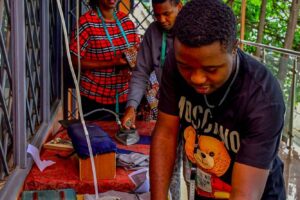
Tips for Ugandan Students Adjusting to Life in Nairobi
Adjusting to life in Nairobi can be an exciting and enriching experience for Ugandan students or anyone moving to the city. While Nairobi offers numerous opportunities for growth and learning, it can also present challenges due to its fast-paced nature and cultural differences. Here are some tips for Ugandans to help them smoothly adjust to life in Nairobi:
- Embrace the Cultural Diversity
Nairobi is a melting pot of cultures from all over Kenya and beyond. Ugandans may find the variety of local languages, food, traditions, and ways of life different from what they are used to. However, this is an opportunity to learn and engage with new cultures.
- Learn about local customs: Nairobi has a rich blend of cultures, especially from different Kenyan communities. Learn a few words or phrases in Kiswahili or local languages like Luo, Luhya, or Kikuyu. It will help you interact better with people.
- Respect cultural differences: While Nairobi is more cosmopolitan, it’s important to recognize and respect local customs, practices, and social norms. For example, in Kenyan culture, there is a strong sense of family and community, so relationships often play a key role in both personal and professional life.
- Understand the Local Transportation System
Nairobi’s transportation system can be a bit different from what Ugandans are used to. Understanding how to navigate the city’s transportation network will make getting around much easier.
- Matatus and Buses: Matatus (minibuses) are the primary form of public transportation in Nairobi. They are affordable but can be crowded and fast-paced, so you’ll need to get used to the hustle. Make sure to have small change on hand to pay for fares. The Nairobi Bus Service is also an affordable option for longer trips.
- Ride-hailing Services: Services like Uber and Bolt are widely used in Nairobi and offer a more comfortable alternative to public transport. They are ideal for getting around more safely, especially if you’re unfamiliar with the city.
- Traffic: Nairobi is known for its heavy traffic, especially during rush hours. Plan accordingly, and always factor in extra time for commuting.
- Find Suitable Accommodation
When adjusting to life in Nairobi, finding the right place to live is essential. Nairobi has a variety of housing options, ranging from budget-friendly to luxurious.
- Explore different neighborhoods: Nairobi has different neighborhoods offering various living conditions. Popular areas for students include Westlands, Kilimani, Ngong Road, and Gikambura. These areas are well-connected, offer affordable housing, and have numerous amenities such as restaurants, cafes, and shopping malls.
- Security: It’s important to prioritize security when looking for accommodation. Choose neighborhoods that are known for their safety and accessibility. If possible, visit the area during different times of the day to assess the safety.
- Shared Housing: For those on a budget, consider renting a room in a shared house or hostel. Many Ugandans in Nairobi opt for shared accommodation to keep costs low while adjusting to life in the city.
- Budget for Cost of Living
The cost of living in Nairobi can be higher than in Uganda, especially in terms of accommodation, food, and transport.
- Groceries and food: The cost of groceries can vary depending on the area, but there are markets such as Kariokor, Gikambura, and Kilimani Market where you can find affordable local produce. Nairobi also has a variety of international supermarkets, but shopping locally can help reduce your expenses.
- Eating out: Nairobi offers a wide range of food options, from street food to fancy restaurants. If you enjoy local Kenyan food, you can find affordable options in cafes, restaurants, and food kiosks across the city. You can try dishes like nyama choma (roasted meat), ugali, and sukuma (greens), which are similar to Ugandan dishes.
- Entertainment: Nairobi has an active entertainment scene with a variety of cinemas, clubs, and malls to visit. However, it’s important to be mindful of your budget when exploring entertainment options.
- Adjust to Different Weather Patterns
Nairobi has a moderate climate, with cool temperatures year-round, unlike Uganda’s warmer and more tropical climate. However, the city experiences rainy seasons during April-May and October-November, which can be a bit different from Uganda’s weather.
- Pack accordingly: Bring clothes that can adapt to the mild temperatures and potential rain. You may need light jackets or sweaters, especially in the cooler months.
- Umbrellas and Raincoats: Be prepared for the rains by carrying an umbrella or wearing a raincoat. It’s common for Nairobi to experience quick downpours during the rainy seasons.
- Be Prepared for Nairobi’s Fast-Paced Lifestyle
Nairobi is a busy city with a lot of things happening at once. Whether it’s traffic, business meetings, or daily errands, life in Nairobi can feel faster and more hectic compared to Uganda’s pace.
- Stay Organized: The fast pace may take some getting used to, so it’s important to be well-organized. Make use of planners or mobile apps to manage your time and keep track of appointments.
- Work-Life Balance: While Nairobi offers a vibrant working environment, it’s also important to find a healthy work-life balance. Make time to relax, explore, and enjoy the social scene outside of work or studies.
- Health and Well-being
The healthcare system in Nairobi is generally well-established, with numerous hospitals and clinics offering both public and private services.
- Health Insurance: Consider getting health insurance to cover any medical needs. Most private hospitals in Nairobi accept health insurance, and it’s a good idea to be prepared for unexpected health issues.
- Routine Health Precautions: Nairobi has fewer health risks compared to some other parts of East Africa, but it’s always wise to take malaria prevention measures, especially if you plan to visit rural areas around Nairobi.
- Stay Connected with Fellow Ugandans
Having a support system is important when living in a new city. Nairobi has a significant Ugandan community, and connecting with fellow countrymen can help ease the adjustment process.
- Join Ugandan Communities: Look for Ugandan community groups and social networks in Nairobi. These groups often organize social events, meetings, and celebrations of Ugandan national holidays, where you can meet new people and share experiences.
- Cultural and Religious Centers: Many Ugandans find comfort in visiting churches or cultural centers where fellow Ugandans gather. These places provide a sense of familiarity and support in a new environment.
- Learn to Navigate Nairobi’s Business Landscape
Nairobi is East Africa’s business hub, and it offers a variety of opportunities for those willing to explore the city’s commercial potential.
- Networking: Take advantage of business networks and events. Nairobi hosts numerous conferences, workshops, and seminars that cater to students, entrepreneurs, and professionals. Attending these events can help you gain insights into the Kenyan job market and make connections.
- Job Opportunities: Nairobi offers a wide range of job opportunities in fields such as IT, engineering, finance, and media. It’s also home to major regional offices of international organizations, which can be beneficial for those looking to work for multinational companies.
- Enjoy Nairobi’s Natural Beauty
While adjusting to urban life, don’t forget to take time to enjoy the natural beauty Nairobi has to offer.
- Nairobi National Park: This is a unique attraction where you can enjoy a safari experience just outside the city.
- Giraffe Centre, David Sheldrick Wildlife Trust, Karen Blixen Museum: These locations provide a great way to learn more about Kenya’s wildlife and history, offering a fun and relaxing break from city life.
Conclusion
Adjusting to life in Nairobi as a Ugandan may take time, but with the right mindset and preparations, you’ll quickly adapt to the vibrant and fast-paced environment. Embrace the cultural diversity, networking opportunities, and educational resources that Nairobi offers, and soon you’ll feel at home in this exciting and dynamic city!


